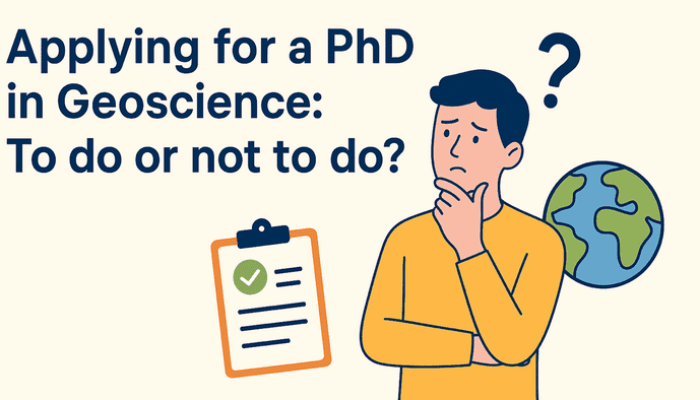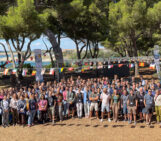
Fresh out of your bachelor’s degree, or more commonly these days, your master’s degree, it can be tempting to pursue your PhD as quickly as possible. While there are compelling reasons to dive straight in, rushing into a PhD might not be your best choice.
To be or not to be a researcher?
Before you start firing off applications, take a step back. Forget any expectations you had for yourself and any assumptions about academic versus non-academic careers. Instead, focus on the most fundamental question: Are you curious and do you want to investigate the inner workings of the Earth and our universe?
If the answer is yes, it is worth taking your time to find the right project that fits you. Don’t rush into the first project you find that’s vaguely relevant to your degree. Quality PhD opportunities are funded regularly—there will be more excellent projects available. Here are some resources where you can find new, interesting projects! If you’re still not sure what it means to do research on a day-to-day basis, or what being a researcher involves, check out our EGU blogs and interviews.
“So, do you want to be a researcher?!”
Now, if you can’t confidently answer that question, hold off on your PhD applications and take the time to read this blog first. In the next sections I will help you figure this out.
1st Challenge: The Timing of the PhD Application
PhD programmes typically open their applications six to twelve months before the start date. They can have strict deadlines, often closing just a few weeks later. This timing creates a significant challenge: you’re often applying halfway through your master’s degree, before you’ve fully developed your research interests (see below) or gained sufficient experience to make an informed decision.
Taking time between degrees allows you to make a more thoughtful choice about your research direction, rather than choosing while still in the middle of your master’s program.
Registering for community mailing lists that share job and PhD opportunities, such as Geotectonics or Earthworks will help ensure you stay up to date.
2nd Challenge: Understanding the PhD Experience
Your next step is crucial: talk to everyone in your relevant network about your plans.
Discussing opportunities with professors can help you gain a clearer understanding of the PhD topics you want to apply for. They can also support your application and even become references. But don’t stop there—ask PhD students and postdocs too. They can give you their honest perspectives from their own experience, insights from their scientific community and plenty of other tips! Share your interests, ask for their guidance, discuss their own journeys. In particular, it is worth reaching out to PhD students and postdocs working in the same laboratory as your prospective PhD application.
This networking serves two purposes: it can lead directly to PhD offers, and more importantly, you’ll hear genuine accounts of what doing a PhD actually involves. These conversations will help you understand whether the research life truly appeals to you.
3rd Challenge: Clarifying Your Research Interests
As soon as you mention you want to do a PhD, one of the first questions you will be asked is: “What topics are you interested in?” While this question can feel intimidating, it shouldn’t be. To define your research interests you can:
-
- Look back at your own work. Think about your master’s thesis or past research projects, what parts did you enjoy the most?
- Explore recent research. Take a look at published papers that spark your curiosity.
- Attend seminars. Today, free online seminars and their replay are all over the web about many different topics! Here are 2 lists posted on our blogs, list 1 and list 2.
- Visit laboratories. If possible, arrange a visit to a lab you’re interested in (especially if they welcome prospective students).
- Talk to others. Discuss with professors, postdocs, and PhD students to get different perspectives and hear about their own research.
- Go to conferences and talks. Many conferences offer reduced fees for undergraduate and master students, and some even allow free participation. For example, EGU is free for undergraduate and master students.
But remember, you are there to learn. You are not expected to know everything about your prospective PhD topic before you even start. The PhD journey is where you’ll develop the skills to become an independent researcher.
Do you feel more confident now about taking the next step and applying for a PhD?
Here is what you need to apply for a PhD!
From my experience, you need four key elements when applying:
-
- Show enthusiasm for their research (essential)
- Show some curiosity about the general project area (essential)
- Bring background knowledge or skills from previous degrees or jobs that could help you stand out from other applicants (important).
- Have recommendation letters and support from professors from previous research projects (essential).
The first two are non-negotiable. Without genuine enthusiasm and interest, you’ll struggle to find a good PhD opportunity, and if you do find one, you likely won’t enjoy the experience in the long term.
The third element doesn’t necessarily require experience in the exact same research topic. Instead, it means having a history that demonstrates your research interest and aptitude. I would also recommend sending an email to the supervisor of any advertised project, introducing yourself and requesting a meeting to chat about the project, before applying.
The fourth element can be critical and will greatly increase your chances of being selected for interviews!
The Importance of Experience
If you lack research experience from jobs, your undergraduate/master thesis, or other projects, it is hard to know what doing research is like. In this case, gaining some experience first is a good idea! This can be done by discussing with professors or contacting them. For example, it is possible in some countries, like in Germany, to become research assistant up to a year before a PhD.
You can also consider working in a non-research role in your field of interest. This approach serves multiple purposes. It helps you identify what genuinely excites you about the field, it clarifies whether you want to pursue research or try something different, and it provides valuable experience regardless of your eventual career path.
Don’t be afraid to explore alternatives!
Remember, a PhD is not the right fit for everyone. It requires patience, time, and often a fair amount of stress. If you decide it’s not what you want to do, that’s perfectly fine, you may actually be saving yourself from years of unnecessary pressure. However, if you still feel confident about your choice of applying for a PhD, then by all means, go for it immediately!
The decision to pursue a PhD is significant and deserves careful consideration. Taking time to gain experience, clarify your interests, and understand what research truly involves will serve you far better than rushing into the first available opportunity. The right PhD opportunity for you will be worth waiting for.
If you made it to this point, it is time to begin the search for the right PhD! Opportunities can come from unexpected sources, so cast a wide but targeted net. Good luck!



